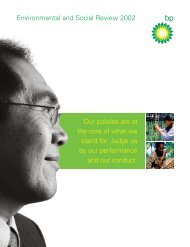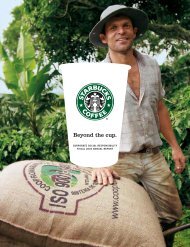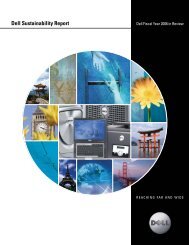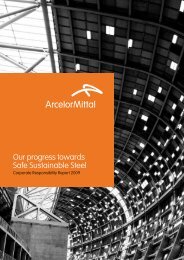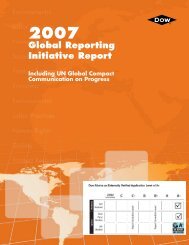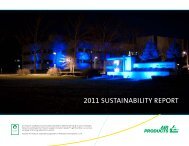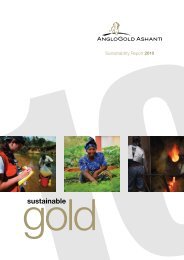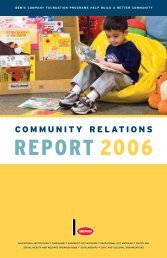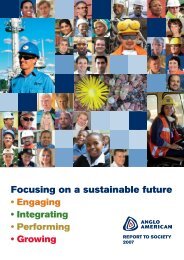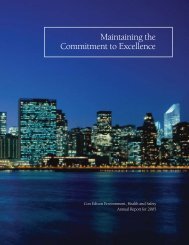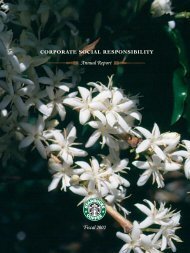Starbucks Corporation CORPORATE SOCIAL RESPONSIBILITY ...
Starbucks Corporation CORPORATE SOCIAL RESPONSIBILITY ...
Starbucks Corporation CORPORATE SOCIAL RESPONSIBILITY ...
You also want an ePaper? Increase the reach of your titles
YUMPU automatically turns print PDFs into web optimized ePapers that Google loves.
Our priorities are to increase the number of trainedverifiers and make the verification process more efficient anduser-friendly. Some adjustments were made in fiscal 2006,and others are in the works.The process improvements we are making are necessary toensure that <strong>Starbucks</strong> coffee buying guidelines are supportedby a highly efficient and credible verification system with thecapacity to serve the growing number of suppliers wanting toparticipate in C.A.F.E. Practices.unique conditions in Africa and Asia Pacific. Also, the needfor more locally based support through regional FarmerSupport Centers has been confirmed.F U T U R E G O A LIn fiscal 2007, we plan to hire additional agronomistswho will focus on helping coffee farmers worldwideimplement C.A.F.E. Practices.F U T U R E G O A L SGoing forward, our efforts will focus on:• Introducing a revised version of the guidelines to allowfor streamlined, efficient and objective scoring.• Updating our guidelines to account for regionaldifferences, including clarification of minimumperformance levels and compliance with local laborlaws and wages for permanent, temporary and seasonalworkers.• Implementing a new IT system for online verifierreporting and score calculation.Extending C.A.F.E. Practices to Africa and Asia PacificIn 2004, <strong>Starbucks</strong> opened a Farmer Support Center in CostaRica, which has allowed us to work more closely with farmersand suppliers on their sustainability measures and coffeequality. Shortly thereafter, suppliers in that region beganapplying and gaining approval for C.A.F.E. Practices, and thenumber has kept growing ever since.Increasing our focus on C.A.F.E. Practices in Africa andAsia Pacific has proven to be difficult, as expected. In Kenya,<strong>Starbucks</strong> has been collaborating with the African WildlifeFoundation (AWF) on various sustainability initiatives as afirst step toward advancing C.A.F.E. Practices in Africa.In both Africa and Asia Pacific, <strong>Starbucks</strong> has been workingto introduce C.A.F.E. Practices to coffee farmers, processorsand suppliers. Progress has been slowed by realities of localcoffee industries, lack of financial transparency, minimalunderstanding of C.A.F.E. Practices among local suppliers,and too few trained verifiers. Some headway was made infiscal 2006 to improve suppliers’ understanding of C.A.F.E.Practices and train more verifiers, partly because of effortsmade by SCS, <strong>Starbucks</strong> coffee buyers, agronomists andbusiness partners to organize training sessions.We realize there may be a need to consider regional guidancefor C.A.F.E. Practices to make the criteria more relevant toMy <strong>Starbucks</strong> –In a letter to <strong>Starbucks</strong>president and ceo, Jim Donald,Estuardo Porras wrote:Since Tropical Storm Stan passed,I have been spending 24 hours a dayassessing the damage on the El Faroand Las Delicias coffee farms inGuatemala. Now I am glad to informyou that C.A.F.E. Practices hasbeen by far our best investment.Both farms are virtually intact inregards to any disease or soil erosionissues. I strongly believe that theimplementation of C.A.F.E. Practices onboth farms has greatly contributed toour ability to withstand any potentialadversities caused by this storm.Your friend,Estuardo Porras, OwnerEl Faro and Las Delicias farms,GuatemalaP R O D U C T S 22



